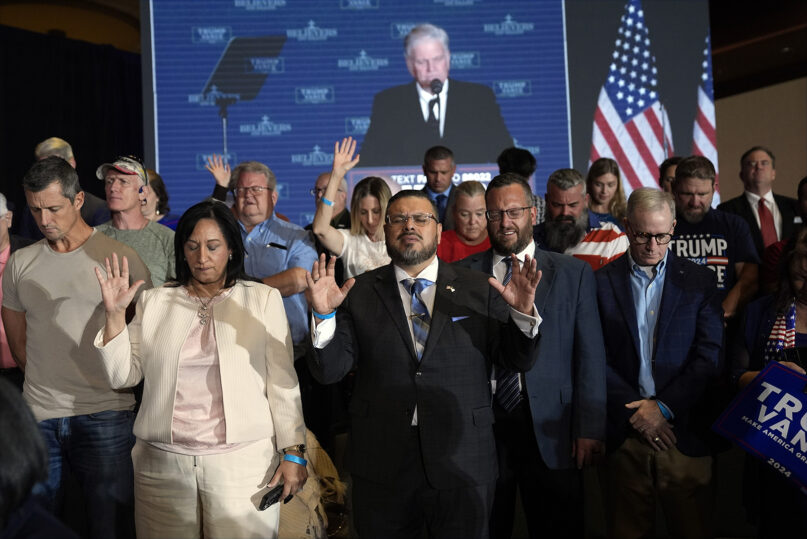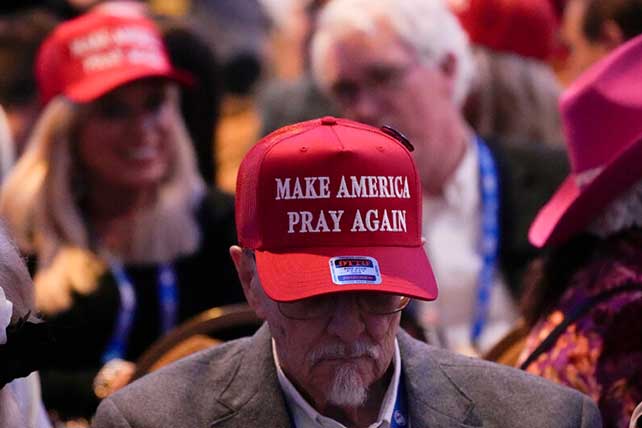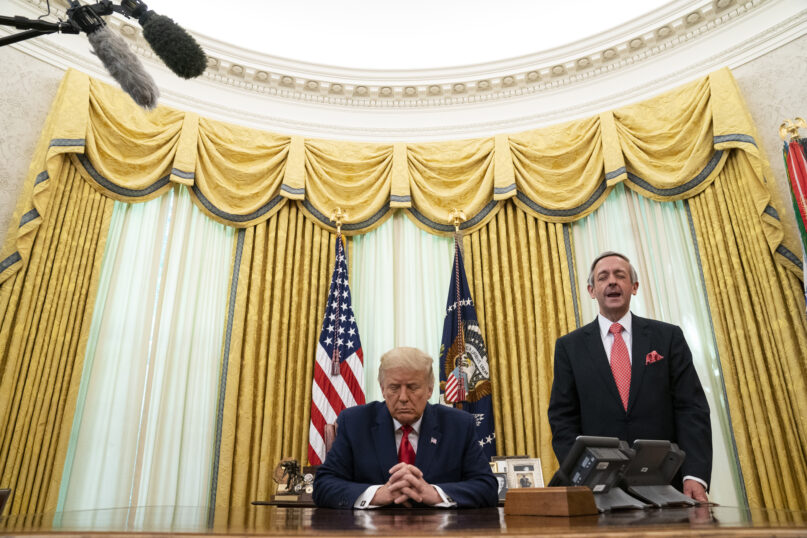(RNS) — Shortly after President-elect Donald Trump finished his victory speech last week in West Palm Beach, Florida, the room burst into a rendition of the Christian hymn “How Great Thou Art.” The moment, which was captured on video, was a reminder of Trump’s robust support among conservative evangelical Christians, who have consistently backed the former president with upward of 80% voting for him in all three of his elections.
Among the crowd in Florida on election night Tuesday (Nov. 5) was longtime Trump supporter Robert Jeffress, the pastor of First Baptist Church in Dallas, who preached a sermon to the businessman on the morning of Trump’s 2017 inauguration. Jeffress described the atmosphere at Trump’s victory party as “electric” and suggested the vibe was similar when he returned to his church last Sunday.
“Our people were elated, for the most part, over the election results,” Jeffress said.
RELATED: Christian Leaders React to Donald Trump Winning the Presidential Election
Conservative Christians have long celebrated what they see as the landmark successes of Trump’s first term, particularly his appointment of three conservative justices to the Supreme Court and their overturning of Roe v. Wade to end nationwide abortion access. This time, however, Jeffress and other evangelical advisers of Trump say they are hoping for more — although exactly what form those policies will take appears to be the subject of debate.
For Jeffress, a key policy concern for Trump’s second term is “protecting the religious freedom of all Americans.”
“The things (Trump) is most interested in is anything that will prohibit not only pastors from preaching what is in their heart, but what would keep laymen from exercising their faith in the workplace, whether it be doctors being forced to perform abortions or high school football coaches not allowed to pray before a football game,” Jeffress said.
Pastor Robert Jeffress and then-President Donald Trump pray after Trump signed a full pardon for Alice Johnson in the Oval Office of the White House, Aug. 28, 2020, in Washington. (AP Photo/Evan Vucci, File)
Trump, for his part, promised during his campaign to create a federal task force to fight “anti-Christian bias,” saying if he didn’t win, Democratic presidential nominee Vice President Kamala Harris would “come after Christians all over the country.” He also promised to get rid of the so-called Johnson Amendment — a part of the tax code that prohibits churches from endorsing candidates — “permanently the next time,” after signing an executive order that weakened the restriction during his first term as president.
“They didn’t want you to speak to people, and if you did they take away your tax-exempt status,” Trump told a group of mostly pastors in Powder Springs, Georgia. “And I said, ‘But these are the people that me and others want to hear from, and you’re not letting them speak. What’s that all about?’”
The Rev. Franklin Graham, son of famed evangelist Billy Graham and head of the Billy Graham Evangelistic Association, said he hoped Trump would address a myriad of foreign policy concerns. He said he was especially hopeful Trump would “find a way to negotiate an end to the war in Ukraine,” suggesting there should be a special ambassador appointed to go to Russia, which invaded Ukraine in 2022, to speak with Russian President Vladimir Putin.
RELATED: John Piper Under Fire for Referring to Trump’s Re-Election as an ‘Evil’
“Democrats demonized the Russians so much that if you talk to them, it looks like you’re doing wrong,” said Graham, who also praised Trump’s efforts to forge a relationship with North Korean leader Kim Jong Un.

People pray with Franklin Graham before Republican presidential nominee former President Donald Trump takes the stage at a faith event at the Concord Convention Center, Oct. 21, 2024, in Concord, N.C. (AP Photo/Evan Vucci)
Graham also said he hoped Trump would work to establish peace amid the ongoing Israel-Hamas war in the Gaza Strip that has spread to southern Lebanon and the surrounding region, noting the president-elect helped bring about a bilateral agreement on Arab-Israeli normalization known as the Abraham Accords during his first term in office. Trump criticized Biden’s handling of the Israel-Hamas war and has urged Israel to “finish the job” and destroy Hamas.
“Now (Trump’s) got somebody who can help restart that and come up with a comprehensive peace deal for that region,” Graham said, referring to Trump’s decision to appoint real estate tycoon Steven Witkoff as his Mideast envoy.
The Rev. Samuel Rodriguez and the Rev. Tony Suarez, the president and vice president of the National Hispanic Christian Leadership Conference, and both Trump faith advisers, listed a desire for Trump to take action on “children’s and parental rights,” especially in regards to transgender children who seek out gender affirming surgery, something conservative Christians have grown increasingly vocal in opposing.
Trump campaigned on the issue, pledging to roll back civil rights protections for transgender students and running an ad that declared “Kamala is for they/them. President Trump is for you.” The president-elect has not detailed his plans to address the topic, although some conservatives have floated excluding transgender students from Title IX protections. Doing so could alter policies in public schools regarding bathrooms, locker rooms and which pronouns students use. Since Trump was elected, transgender youth have flooded crisis hotlines, according to The Associated Press.


